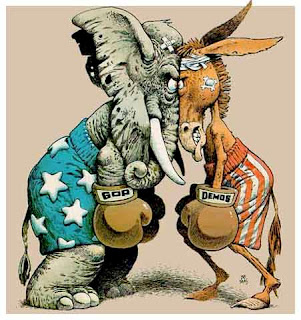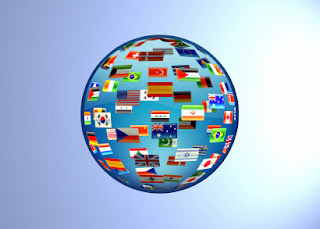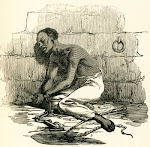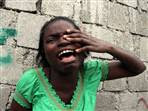
Let's continue using the hand analogy from the previous blog entry. In many ways it's an excellent visual representation of what I'm trying to accomplish here--create a model for black economic development and autonomy, which draws upon the collective resources of the entire black community.
The cupped hand visual, in the upper left hand corner of this page, is the perfect image for my purpose: It represents the position the hands must be in to give something away, or to receive something that's given. Splayed fingers--fingers spread out and apart--pretty much represents the challenge facing us, as we attempt to bring blacks together in a cohesive manner to work on behalf of the black community in a collaborative way.
To form a cup, the fingers of the hand must be pressed tightly together, with little or no space between them. To form a black collective something similar must occur. But first we need a cup. We need to build a structure that will encourage, and promote, a coming together of members from the black community who have common interests, and aspirations--all working to achieve prescribed goals and objectives.
The cupped hand, then, represents the Black Collective Motto:
To Give and To Receive. The fingers pressed tightly together to form the cup suggest the level of black cooperation that's needed to further our economic interests. If we're to progress at a pace commensurate with our need, we'll have to find ways to contract the distance between us--spatially, as well as educationally, socially, and economically.
Here's another visual to give us all an appreciation of the problem, the blue representing black population density. Click or double click on the map to enlarge it.

This next visual will make the above density map a bit clearer, and show those states with the largest black population.

That blacks are densely populated works to our advantage. It makes collaborative efforts that much easier. To the degree that we're splayed, so to speak, primarily East Coast, West Coast, works against us, but even that impediment to black cooperation can be overcome.
Any model constructed for the purpose of black economic development and autonomy, must take into account the construction of a
New black Synergy, one that will rebuild black interactivity; a
New Black Ecosystem to restore the brain drain that has devastated inner city population centers when blacks abandoned their communities once their economic situation made it possible; and a
New Black Cooperation, one built on the
Main Ingredient of Trust [1], which undergirds, and gives impetus to,
The Indispensable Factor. [2]
During my research, I came across an article by one Hayward Derrick Horton, professor, titled: A SOCIOLOGICAL APPROACH TO BLACK COMMUNITY DEVELOPMENT: PRESENTATION OF THE BLACK ORGANIZATIONAL AUTONOMY MODEL. [3]
Under the following heading,
Implications For Community Development Practitioners, Horton discusses his model for black economic autonomy:
The BOA [Black Organizational Autonomy] model has three implications for community development practitioners. First, efforts to address problems of the black community are more likely to be successful when indigenous groups are empowered to plan and act independently of external factors. This empowerment is derived from economic autonomy. To reiterate, economic autonomy is not separatism. Nor does it imply that the black community should either reject or ignore external supporters and allies. In fact, the evidence suggests that being economically autonomous is the best basis for gaining external support and building lasting alliances. Otherwise, the black community has a subordinate, dependent status. One might argue that such is the current status of the black community. Recent studies documenting the attitudes and opinions of white America toward black America certainly demonstrate that dependency makes the black community vulnerable to scapegoating (Gans, 1988; Kluegel, 1990).I agree largely with the professor's description of what an
Autonomy model should look like--first, that it's not "separatism," and, second, the black community can be economically autonomous, and still have "external supporters and allies."
In the following abstract of his article, the professor offers this overview:
This paper presents a sociological model of black community development: the Black Organizational Autonomy (BOA) model. The BOA model argues essentially that viable black communities are those with organizations that have the following characteristics: 1) economic autonomy; 2) internally developed and controlled data sources; 3) a focus on black history and culture; 4) the development and incorporation of females in leadership roles; and 5) socially inclusive leadership. A case study is presented that supports the model. The paper concludes with a discussion of the implications of the BOA model for community development practitioners. [4 ibid]
In the comment section of an earlier blog entry, I left these words. Now seems the perfect time to resurrect them, and give them new life:
Here's part of the problem [to black economic development]: Blacks have never enjoyed complete [economic] autonomy. Not even Marcus Garvey could achieve such a feat, although he did make the attempt with the formation of the "Universal Negro Improvement Association and began speaking out publicly in favor of worldwide black unity and an end to colonialism." [...]
Worldwide black unity is still a great idea, and should be the goal of blacks in this country, as difficult as that task might be--with black unity here being so elusive.
Our dependence on whites in this country in order to advance materially is too all-inclusive. Think of the power blacks would possess, if the black nations of the world could come together and forge alliances with black people scattered around the world--as a result of what has been called the black or African diaspora--for the advancement of blacks throughout the world, regardless of their nation of origin.
There's a United Nations. Why can't blacks create something similar: A Union of Black African Nations (UBAN), with black delegates from black nations, and non-black nations, setting health, social, economic, and political goals, and developing the organizational structure, and mechanisms to achieve those goals.
Now, if we could pull something like that off, using the vast black resources (the intelligentsia, and natural resources) available to blacks worldwide, we'd be a powerful force to be reckoned with.The New Way
The New Way will forge new relationships, and a new cooperation among blacks using the technology at our disposal, primarily the Internet. Because distance will no longer be an impediment to black cooperation, black synergy can now exist across miles of separation, allowing blacks to interact in ways never before thought possible. Had the Internet been available during Garvey's time, he and his contemporaries would have found it considerably easier to achieve their rather ambitious goal of uniting blacks for the purpose of building a sustainable black economy.
The New Way will bring black resources--social, political, cultural, economic--under one tent, recognizing that, although the tent will be pitched in the midst of the larger economy, it doesn't have to take on the amoral and immoral character of the whole, but strive to create an economy that's humane and life-supporting.
With
The New Way leading the way, I propose the following concept,
The Black Town Square, a concept that I'll explore in greater, but not exhaustive, detail in subsequent articles. The proposed town square will be a virtual town square--not one built from bricks and mortar. And that's a good thing: It will make the Town Square accessible to blacks across the nation, and from any part of the world that offers access to the vast networks of the
Information Highway. In the United States, the town square will be called The Black Town Square of America--
America, because it's here that the concept will first be tested,
Black, because blacks will be the racial group targeted, and
Town Square, because the name projects friendliness, welcomeness, and warmth.
I propose further that, with the success of the American model, we expand it to other areas of the world that have high black concentrations. For example, in South Africa, the town square there might be known as
The Black Town Square of South Africa. Taken together, the various town squares will be known as
The Black Town Squares of the World.
How is that for thinking big!
Just as I did in previous articles, I will now leave you with something to chew on. It constitutes a rather large mouthful, but it will give us something to sink our teeth into as we explore ways to address those issues that are unique to blacks, and the black community--all with an eye toward constructing a model to foster black community development, empowerment, and economic autonomy. No date is given for the article below, but it seems to have been written sometime during the first half of the current decade. Although many blacks may have seen their fortunes reversed as a result of the recession that now grips this country, I wanted to present the information below, despite its sanguinity. I wanted to show what we can do collectively, if the economy is healthy, and we invest appropriately.
African American Wealth: Powerful Trends and New OpportunitiesAfrican Americans are steadily increasing their wealth, boosting their holdings in real estate, stocks, and savings vehicles, as they seek to fund college educations for their children and create a secure retirement for themselves. It's a process of becoming ever more keenly aware of the need to save, invest, and plan for the future. "The level of interest in financial independence, economic empowerment, and investing has just exploded," said Duane Davis, founder of the Coalition of Black Investors quoted in a 2003 article that appeared on www.IMDiversity.com. Davis characterized this growth as "a real groundswell."
InvestmentDavis' view was reinforced by results of the 2002 Ariel Schwab Black Investor Survey cosponsored by Ariel Mutual Funds and Charles Schwab. The Survey, published annually every year since 1998, publishes data on African American households earning $50,000 or more a year. According to findings from 2002, the percentage of African Americans investing in the stock market increased 30 percent between 1998 and 2002, from 57 to 74 percent.
Unfortunately, that number dipped to 61 percent according to the 2003 Survey, as many African Americans left the market, no doubt bruised by the poor returns that characterized the stock market for the second consecutive year. Equally unfortunate, many stayed on the sidelines this past year and missed the recent market rally. "The recent market upswing shows that you may have to go through the valleys to reach the peaks," said Charles Schwab vice president Carla A. Foster, in the Survey's analysis section.
Home–ownershipHomeownership among African Americans, however, has shown a steady increase. The percent of African Americans who own their own homes increased from 42 percent in 1990 to 48 percent in 2003, according to data compiled by the Consumer Federation of America and BET.com, and cited in an October 2003 press release.
SavingsAfrican Americans spent $645.9 billion in 2002, an increase of 104 percent from 1990, according to Target Market News, a black consumer market research and information company (www.targetmarketnews.com) However, as noted African American author, speaker, and financial advisor Brooke Stephens points out in her book Talking Dollars and Making Sense, making money is important, but saving it is more important. Stephens cautions that while the African American community can be proud of contributing hundreds of billions to the nation's economy, it's essential not to lose sight of the importance of savings in creating economic empowerment and building personal wealth. "You're not building wealth if you use all your money for consumption," she writes. "Real wealth is being able to say, 'I have the freedom to do what I want with my life, and I don't have to stay in this job if I don't want to.'"
The 2002 Ariel Schwab Survey noted steady progress in the area of personal savings among African Americans, with the average monthly savings increasing from $200 per month in 2001 to $237 per month in 2002. (2003 figures aren't available yet.) Building a secure retirement ranked highest among the respondents (46 percent) as their primary reason for saving, with sending a child to college ranking second at 19 percent. [...]
Black Enterprise magazine has created the Circle of Wealth, a black wealth initiative that seeks economic empowerment for African Americans by changing attitudes toward money management. The Circle is an ongoing cycle comprised of 1.) Knowledge, 2.) Commitment, 3.) Investment, 4.) Portfolio Management, and 5.) Wealth, all enabling Reinvestment in Children, Businesses, and Community.
As part of this powerful initiative, the magazine developed the Declaration a Financial Empowerment, the following 10–point wealth–building pledge:
"I, from this day forward, declare my vigilant and life–long commitment to financial empowerment. I pledge the following:
To save and invest 10 to 15 percent of my after–tax income.
To be a proactive and informed investor.
To be a disciplined and knowledgeable consumer.
To measure my personal wealth by net worth not income.
To engage in sound budget, credit, and tax management practices.
To teach business and financial principles to my children.
To use a portion of my personal wealth to strengthen my community.
To support the creation and growth of profitable, black–owned enterprises.
To ensure my wealth is passed onto others.
To maximize my earning power through a commitment to career development, technological literacy and professional excellence."
(Source: www.blackenterprise.com) [5]
[1]
The Main Ingredient: Trust is the element, the ingredient upon which a
New Black Economy may be built--as well as nation states--and form the basis upon which all enterprises may flourish, provided people of goodwill have developed the will to put the good first.
[2]
The Indispensable Factor: It's a black collective willingness to collaborate in large enough numbers, on a broad enough scale, to push our economic agenda forward with great deliberation, and great haste, taking advantage of those means at our disposal to expedite this push.
[3]
A Sociological Approach To Black Community Development: Presentation Of The Black Organizational Autonomy Model.[4 ibid]
[5]
African American Wealth: Powerful Trends and New Opportunities
 The Pledge:
The Pledge:



















